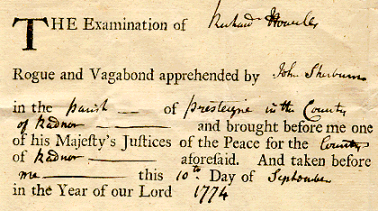
Care of the Poor
The Settlement Laws
The forced removal of paupers
Under the Law of Settlement of 1662 the overseers of the
parish could order the forcible removal of any stranger to the
parish who might become a burden on the funds available for poor
relief.
Children were given settlement in the place where they were born,
even if they were illegitimate, so parish overseers tried to
remove pregnant, unmarried women before their child was born.
Farmers could not take on workers for seasonal jobs such as the
harvest unless they carried a certificate from their home parish
to prove that they would be accepted back afterwards
The Quarter Sessions document below is part of the record of an examination of one Richard Howells as a suspected 'rogue and vagabond' by a Justice of the Peace in 1774. There is more from this paper on the following page.
The examination of a
pauper from the
Radnorshire
Quarter Sessions,
Michaelmas 1774
Powys
County Archives
R/QS/R35

The Settlement Act of 1697 had similar aims to the
earlier laws, and it laid down that people wishing to move to
another parish to live would require a document provided by their
home parish as a safeguard against their future poverty.
Around this time paupers became known as "badgers"
because of the prominent "P" badge which they were
forced to wear, identifying the parish to which they belonged.
There are 4 pages on the Settlement Laws. Use the box links below to view the other pages.